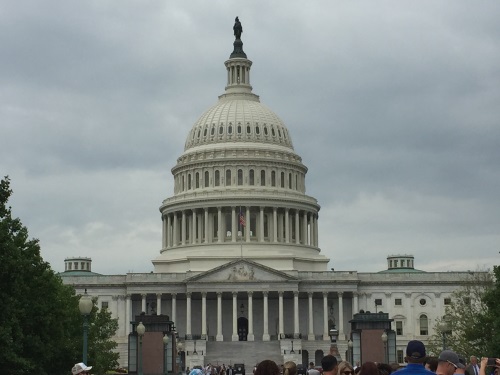Sen. Shelley Moore Capito, R-W.Va., noted in a Bloomberg TV interview on May 19 that major sticking points on crafting a bipartisan infrastructure investment bill center on what gets called “infrastructure” and how to pay for it.
Yet President Joe Biden also signaled his willingness to compromise with Republicans on his infrastructure proposals during a media event May 18 in Dearborn, MI.

“The Vice President and I have had a number of meetings in the Oval Office with Republican leaders in Congress and members of Congress,” the president said during his remarks at the event.
“We believe we can find a bipartisan deal on infrastructure. And we look forward to hearing more details of their proposal,” he added. “But we’ve made one thing clear: We’ll compromise, but doing nothing is not an option.”
“The best way to look at it is what we need and then what that’s going to cost and how we pay for it,” Sen. Capito explained during her interview. “Let’s look at the essential infrastructure items: roads and bridges, waterways, airports, rail, and broadband. [Then] let’s put together a robust package and let’s move the numbers where we need to do that.”

Sen. Capito – the ranking member on the Senate Environment and Public Works Committee – is one of the sponsors of a five-year, $568 billion infrastructure investment framework unveiled by Republicans on April 22 to serve as an alternative to the $2.3 trillion American Jobs Plan proposed by President Biden on March 31.
In terms of how to pay for the Republican alternative, Sen. Capito continues to focus on “repurposing some of the COVID [relief aid] dollars” that many states are not using.
“I’ve been looking at those 21 states that are no longer paying the enhanced unemployment,” she said. “Why don’t we repurpose those dollars to help those folks coming off unemployment to get work in an infrastructure package? It sounds like a good win-win situation for those dollars.”
Beyond the immediate questions around infrastructure investments, transportation experts are closely watching Congress for progress on legislation to reauthorize the current federal surface transportation legislation known as the Fixing America’s Surface Transportation or FAST Act, which expires in September.
This week, Republicans on the House of Representatives Transportation and Infrastructure Committee released their version of a surface reauthorization bill, which they dubbed Surface Transportation Advanced through Reform, Technology, & Efficient Review or the STARTER Act 2.0.
The Republican proposal – introduced by Rep. Sam Graves, R-Mo., ranking member on the T&I committee – would invest more than $400 billion over five years. It also expands on legislation originally proposed by the Republican T&I caucus during the last Congress in June 2020.
House T&I Democrats are currently preparing their own surface reauthorization bill, which could be ready in June.
 Nation
Nation
The Stream by AASHTO: Electrified Roadway Testing
December 5, 2025 Nation
Nation

